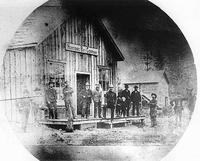Hudson's Bay Co
HUDSON'S BAY COMPANY (HBC), Canada's oldest corporation, was formed in 1670 when a group of merchant-traders in England received by royal charter the exclusive right to trade in northern N America. HBC competed with French merchants for dominance in the FUR TRADE until 1763, when Great Britain won control of Canada. After 1763 the French were replaced by Montreal traders, who carried on a spirited competition under the banner of the NORTH WEST CO until 1821, when HBC absorbed its rival. As part of the merger, HBC took over the fur trade in BC. The company inherited several trading posts in NEW CALEDONIA, along with Fort George, then the headquarters of trade on the COLUMBIA R. In 1825 the headquarters moved to Fort Vancouver farther up the river, from where traders communicated with their inland empire to the north via the Columbia and the OKANAGAN VALLEY (see FUR BRIGADES). The company also expanded up the coast, establishing trading posts at FORT LANGLEY in 1827, FORT SIMPSON in 1831 and FORT McLOUGHLIN in 1833. In anticipation of the impending border settlement between Great Britain and the US, HBC opened FORT VICTORIA at the south end of VANCOUVER ISLAND in 1843. This fort subsequently became the headquarters of the company's BC trade after the OREGON TREATY of 1846. When the British decided to colonize Vancouver Island they turned to HBC and in 1849 granted the company proprietorial rights to the island. In return HBC was expected to encourage land settlement. This arrangement lasted until 1859, when Great Britain took direct control of the colony (see VANCOUVER ISLAND, COLONY OF). Meanwhile, the gold rush of 1858 (see GOLD RUSH, FRASER R) forced the creation of the mainland colony of British Columbia. When HBC Chief Factor James DOUGLAS was appointed gov of the new colony he was required to give up his position with the company. The British government did not renew HBC's right to exclusive trade in the colony and the company now functioned like any other private enterprise. HBC continued to dominate the fur trade by virtue of its long experience and established infrastructure, but technically the field was open to competitors. As the colony filled with settlers the fur trade became just one aspect of the HBC's business and gradually it phased out its trading forts and opened the general retail stores for which it subsequently became known—and which continue to do business in communities throughout the province.

